Health
Sleepy during the day? It could be an early warning sign of dementia, study suggests

Feeling sleepy during the day could signal a more serious issue for some groups.
A new study published in the journal Neurology revealed a possible connection between daytime sleepiness in older people and dementia risk.
People who lack enthusiasm for activities and feel sleepy during the day were found to have a higher risk of developing a condition called motoric cognitive risk syndrome (MCR).
‘HOW MUCH SLEEP IS TOO MUCH?’: ASK A DOCTOR
MCR can cause people to walk at slower speeds and experience memory issues – and it can occur before dementia develops.
Researchers found that people with a lack of enthusiasm and daytime sleepiness are more than three times more likely to develop MCR. (iStock)
The study, led by Albert Einstein College of Medicine in the Bronx, New York, included 445 participants averaging 76 years of age who did not have dementia.
Participants were asked about memory issues and walked on treadmills to assess their walking speeds. This was repeated once a year for an average of three years.
The group also completed a sleep assessment to gauge sleeping problems, patterns and medications.
TO IMPROVE YOUR SLEEP, DO THIS ACTIVITY BEFORE BED, EXPERTS SUGGEST
The researchers also tracked how often people had trouble staying awake while driving, eating or being social, as well as their issues maintaining enthusiasm for daily tasks.
At the start, 42 people had MCR, while another 36 developed the condition during the study.
After adjusting for factors like age, depression and other health conditions, researchers found that people with a lack of enthusiasm and daytime sleepiness were more than three times as likely to develop MCR.
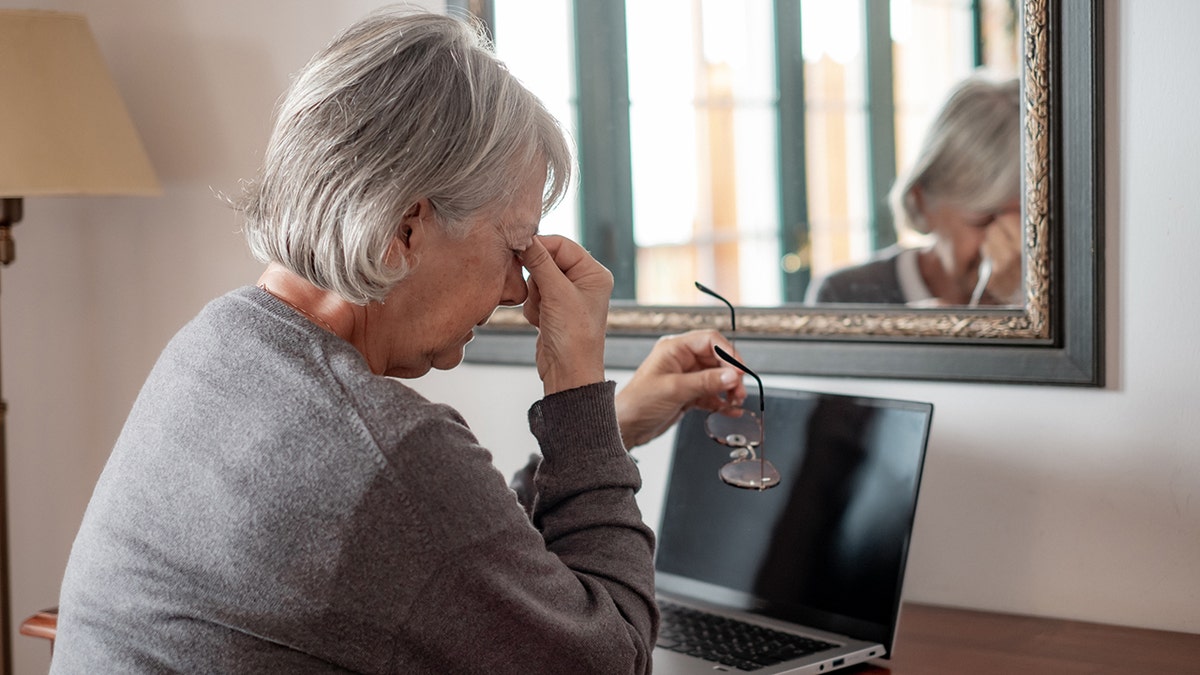
MCR can cause people to walk at slow speeds and have memory issues. It can occur before dementia develops. (iStock)
“Our findings suggest that sleep issues affecting daytime wakefulness are most strongly associated with later cognitive risk,” study author Victoire Leroy, MD, PhD, of Albert Einstein College of Medicine in New York, told Fox News Digital.
“This supports the hypothesis that sleep-related problems, particularly daytime sleepiness, are connected to cognitive impairment in older adults.”
CLICK HERE TO SIGN UP FOR OUR HEALTH NEWSLETTER
“More research needs to be done to look at the relationship between sleep issues and cognitive decline and the role played by motoric cognitive risk syndrome,” Leroy added.
The study did have some limitations, the researchers noted.
It did not prove that sleep-related issues cause MCR, but only showed an association. Participants also self-reported their own sleep information, which left some room for bias.

Sleep-related daytime impairment remained a significant risk factor for MCR even after adjusting for depression. (iStock)
“These results should be interpreted with caution due to several limitations in the study, and the association is not shown to be causal,” Leroy told Fox News Digital.
“Further research is needed to validate this relationship and its underlying mechanisms.”
Sleep expert Dr. Wendy Troxel, RAND Corporation senior behavioral specialist and licensed clinical psychologist in Utah, commented on the study in a conversation with Fox News Digital.
“Our findings suggest that sleep issues affecting daytime wakefulness are most strongly associated with later cognitive risk.”
As sleep problems and depression are “highly related,” it’s “important to disentangle whether their sleep problems uniquely contribute to MCR, over and above the effects of depression,” said Troxel, who was not involved in the study.
“Results showed that people with poor sleep quality had a higher chance of developing MCR, but this link was no longer significant when accounting for depression,” she added.
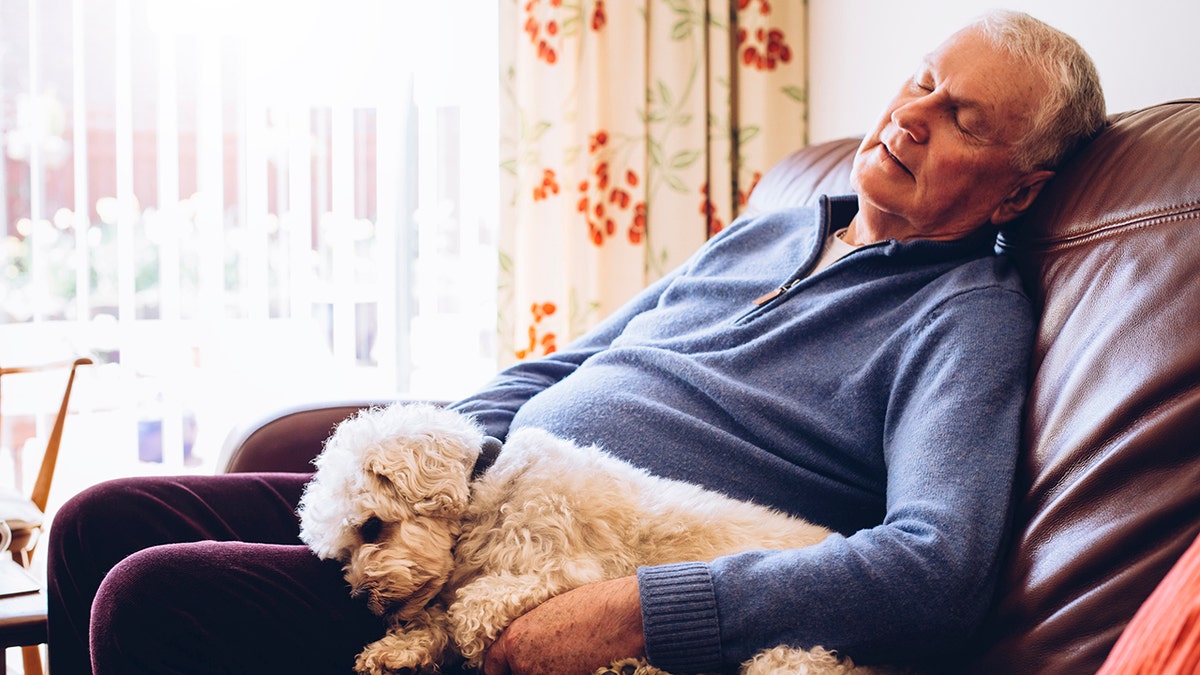
One study limitation is that participants self-reported their own sleep information, the researchers added. (iStock)
Sleep-related daytime impairment remained a significant risk factor for MCR even after adjusting for depression, according to Troxel.
“These findings add to a growing body of evidence suggesting that promoting sleep health may be an important strategy to reduce the risk of dementia and emphasize the need for better screening and diagnosis for sleep disorders, such as insomnia and sleep apnea,” she said.
For more Health articles, visit www.foxnews.com/health
These disorders are “prevalent and treatable” in both men and women, Troxel noted, but they remain “under-diagnosed and under-treated.”
The study was supported by the National Institute on Aging.

Health
What is sunset anxiety? Here's how to know if you have late-day distress

Nearly 20% of American adults reported having an anxiety disorder in the past year, data shows — and many are more likely to feel uneasy and anxious as the sun sets.
While “sunset anxiety” isn’t an official medical diagnosis and does not appear in the Diagnostic and Statistical Manual of Mental Disorders (DSM-5), some mental health experts agree that it’s a very real phenomenon.
The symptoms aren’t limited to just anxiety, according to Andrea D. Guastello, PhD, a licensed psychologist at the University of Florida Department of Psychiatry.
ADDING LAUGHTER TO YOUR LIFE CAN BOOST HEALTH AND HEALING, EXPERTS SAY
“It can be any psychiatric symptom that increases in frequency or intensity as the sun goes down or at night,” Guastello told Fox News Digital.
Symptoms may include feelings of depression, isolation and hopelessness that tend to increase at night, the expert said.
While “sunset anxiety” isn’t an official medical diagnosis and does not appear in the Diagnostic and Statistical Manual of Mental Disorders (DSM-5), some mental health experts agree that it’s a very real phenomenon. (iStock)
What is sunset anxiety, exactly?
Sunset anxiety occurs when a person starts to feel anxious as the sun goes down at the end of the day, Beena Persaud, PsyD, clinical psychologist with Cleveland Clinic Akron General in Akron, Ohio, told Fox News Digital.
“The lack of natural light can cause people to have less energy and motivation, restless discomfort, worry and nervousness about accomplishing tasks,” she said.
GRATEFUL CHILDREN MAKE PARENTS HAPPIER AND LESS STRESSED, NEW STUDY SUGGESTS
People who have previously experienced episodes of anxiety and are generally more on the anxious side are more susceptible, Persaud said, as are people who have a heightened sensitivity to light changes and those who consider themselves to be “night owls.”

“Adults are more likely to feel it than teens or children, and this may be due to adults’ sense of responsibility for daily activities,” one expert said. (iStock)
There are no specific gender or racial tendencies for sunset anxiety, the expert noted.
“Adults are more likely to feel it than teens or children, and this may be due to adults’ sense of responsibility for daily activities,” she added.
Common triggers
The onset of sunset anxiety could be related to the circadian rhythm, which is the body’s internal clock that regulates many functions, according to experts. The circadian rhythm is influenced by the production of melatonin, Persaud said.
“We know there can be hormonal changes with winter and daylight saving time,” she told Fox News Digital.
“Since our production of melatonin is easily affected by light, early darkness can cause symptoms of both anxiety and depression. The body believes it should be getting ready for bed because of the darkness.”
“The lack of natural light can cause people to have less energy and motivation, restless discomfort, worry and nervousness about accomplishing tasks.”
Experts report an increase in seasonal anxiety from October to late March.
“The changing of the seasons and earlier darkness make it a prime time for people to experience both sunset anxiety and seasonal depression,” Persaud said.
CLICK HERE TO SIGN UP FOR OUR HEALTH NEWSLETTER
Anxiety can also occur if someone is carrying a heavy mental load of activities and responsibilities and struggling to complete them all by the evening.
“Darkness occurring earlier makes us physically and emotionally tired, and we feel as if the day is ending before we can achieve our daily goals,” said Persaud.
Tips to alleviate sunset anxiety
Guastello at the University of Florida offered the following tips to help curb anxiety around sunset.

If you experience worsening or persistent symptoms of sunset anxiety that don’t improve with the above lifestyle changes, experts recommend consulting with a mental health provider. (iStock)
Set reasonable goals for yourself.
Plan enjoyable activities around the time your anxiety usually kicks up.
Health
'Miracle therapy' could correct heart failure in kids

Fox News’ Health newsletter brings you stories on the latest developments in health care, wellness, diseases, mental health and more.
TOP 3:
– Stem cell therapy could correct heart failure in children, say doctors and specialists at the Murdoch Children’s Research Institute in Melbourne, Australia.
– Doctors saved a pregnant woman and her baby after discovering a grapefruit-sized tumor in her chest cavity.
– A second-grade boy saved his friend from choking by doing the Heimlich maneuver in the school cafeteria – and it was caught on camera.
Researchers at MCRI are studying and reprogramming the potential of the blood to treat disease, specifically heart failure in children. (iStock)
MORE IN HEALTH
REST AND RECHARGE – Quality sleep can be tough to come by during the holidays. A clinical psychologist offers expert advice for snoozing during the busy season. Continue reading…
‘MAJOR STEP FORWARD’ – The FDA has approved the first medication for obstructive sleep apnea, which also promotes weight loss. Continue reading…
FOLLOW FOX NEWS ON SOCIAL MEDIA
YouTube
SIGN UP FOR OUR NEWSLETTERS
Fox News First
Fox News Opinion
Fox News Lifestyle
Fox News Health
Fox News Autos
Fox News Entertainment (FOX411)
DOWNLOAD OUR APPS
Fox News
Fox Business
Fox Weather
Fox Sports
Tubi
WATCH FOX NEWS ONLINE
Fox News Go
STREAM FOX NATION
Fox Nation
Health
Pregnant woman and baby saved after doctors find grapefruit-sized tumor: 'Extremely rare'
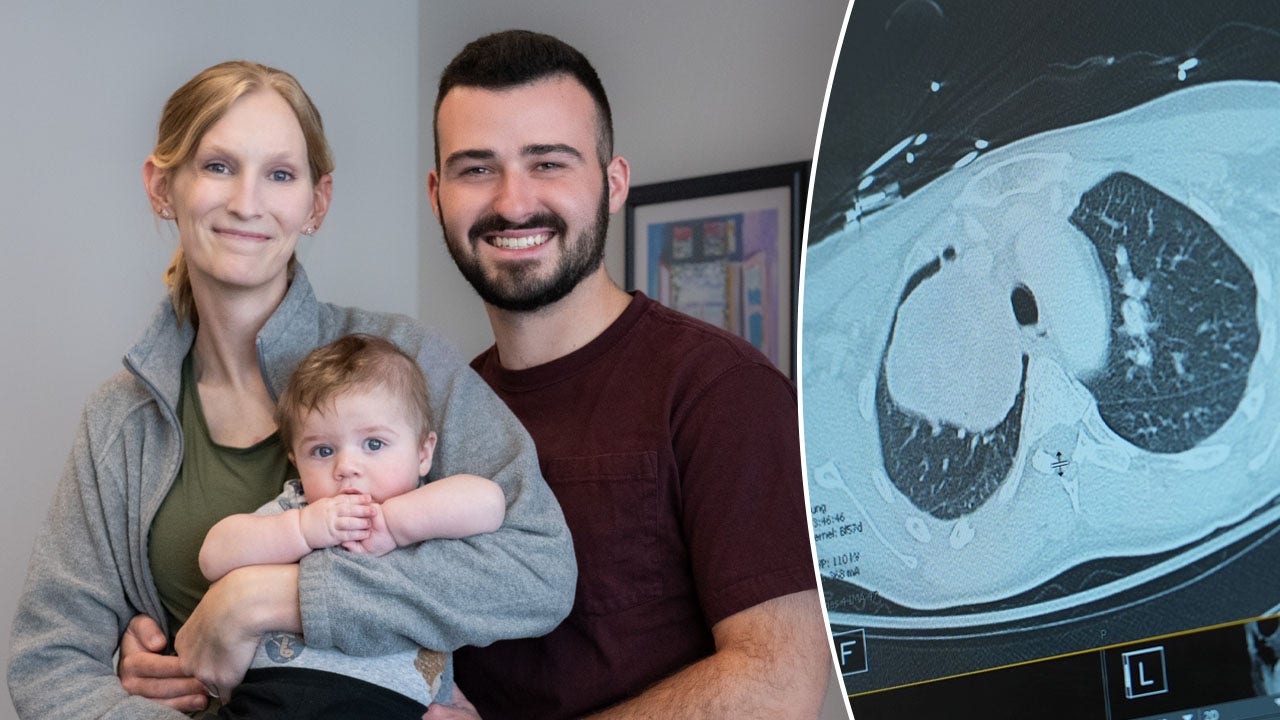
A Chicago woman was just weeks away from giving birth when a nagging cough led to a shocking medical discovery.
MaKenna Lauterbach, then 26 years old, began experiencing severe coughing fits in the last three months of her pregnancy.
“They would be so severe that I would become winded and nauseous to the point of vomiting,” she told Fox News Digital.
PREGNANT WOMAN WITH BRAIN CANCER REFUSES ABORTION
Lauterbach, who lives on a farm in Washburn, Illinois, also began noticing shortness of breath while tending to her horses and goats.
“I give hay to the horses every morning and noticed how winded I was becoming with a dry cough,” she said. “My body felt like I just ran two miles, when, in reality, I had only walked to the barn and back.”
MaKenna Lauterbach, pictured with her husband, Parker, and new baby, Colter, was diagnosed with stage 3 melanoma. (Northwestern Medicine)
Some doctors dismissed Lauterbach’s symptoms, she said, repeatedly telling her, “It’s because you are pregnant.”
Eventually, though, when the coughing led to vomiting, doctors performed scans and detected a large, grapefruit-sized tumor in her middle chest cavity and right lung, which was completely blocking the artery to the right lung.
PREGNANT MOM WITH CANCER DEFIED DOCTORS’ ABORTION GUIDANCE
“It’s extremely rare to see this type of tumor invading into the major blood vessels of the heart,” said Chris Mehta, M.D. — a cardiac surgeon with the Northwestern Medicine Bluhm Cardiovascular Institute who specializes in complex heart reconstruction — in a press release.
“It’s extremely rare to see this type of tumor invading into the major blood vessels of the heart.”
“We may see something like this once every few years.”
The tumor had put Lauterbach — and her baby — into respiratory distress.
‘In real trouble’
Lauterbach was flown to Northwestern Memorial Hospital in Chicago, where a large medical team was waiting for her.
“MaKenna was in real trouble, and we had to act quickly – this wasn’t something that could wait for Monday morning,” said Lynn Yee, M.D., maternal-fetal medicine specialist at Northwestern Medicine, in the release.
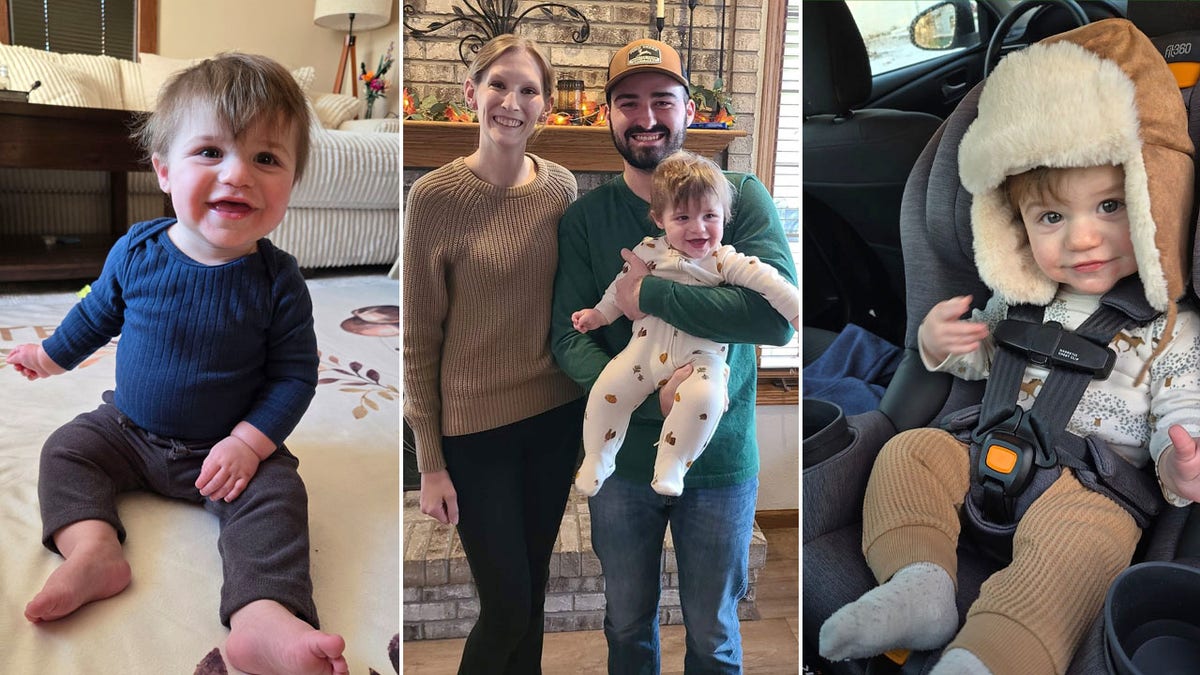
Though he was born three weeks early, little Colter is a thriving, happy baby boy today. “As for myself, I am still healing, emotionally and physically,” said Lauterbach. (MaKenna Lauterbach)
“When you’re pregnant with a baby that’s nearly full term, your lungs already aren’t functioning at full capacity, and when you add a huge tumor on top of it, you run the risk of having respiratory collapse and cardiac arrest.”
The baby was not tolerating the contractions well and Lauterbach’s blood pressure was plummeting.
THE YEAR IN CANCER: ADVANCES MADE IN 2024, PREDICTIONS FOR 2025
The team performed an emergency cesarean section — and on Easter Sunday, a healthy baby boy, Colten, was born.
‘Blindsiding news’
After the delivery, it was time to address the tumor.
“The tumor was sitting on top of MaKenna’s heart and extended into the right lung, impacting all three lobes and the entire main trunk of the pulmonary artery,” said Kalvin Lung, M.D., a thoracic surgeon with the Northwestern Medicine Canning Thoracic Institute, in the release.
Doctors performed a biopsy and diagnosed Lauterbach with stage 3 melanoma.

The Lauterbach family lives on a farm in Washburn, Illinois. MaKenna Lauterbach first experienced severe coughing fits and shortness of breath when tending to the horses and goats. (MaKenna Lauterbach)
The doctors believe she may have had a melanoma on her skin at some point, and that “a cell or two escaped” and began growing inside her body.
“It was truly blindsiding news,” Lauterbach told Fox News Digital. “When I first got the diagnosis, I went through a roller coaster of emotions.”
“I was grieving the birth plan I had spent months preparing, while also dealing with the news of my unexpected diagnosis.”
After first feeling relief at having an answer, she said she felt some anger that her symptoms had been dismissed earlier. Then there was the fear of the cancer itself.
“Because of the tumor, the delivery happened so quickly. I was grieving the birth plan I had spent months preparing, while also dealing with the news of my unexpected diagnosis,” she said.
“My situation was serious, and while my clinical team was working on a plan to treat my cancer, it was comforting to know that the NICU nurses [at Northwestern] were taking such wonderful care of our son.”
Taking life-saving action
The team at Northwestern recommended that Lauterbach undergo three cycles of immunotherapy before surgery, which helped shrink her tumor by 30%.
Dr. Lung and Dr. Mehta removed Lauterbach’s entire right lung, parts of the main pulmonary artery and her lymph nodes.
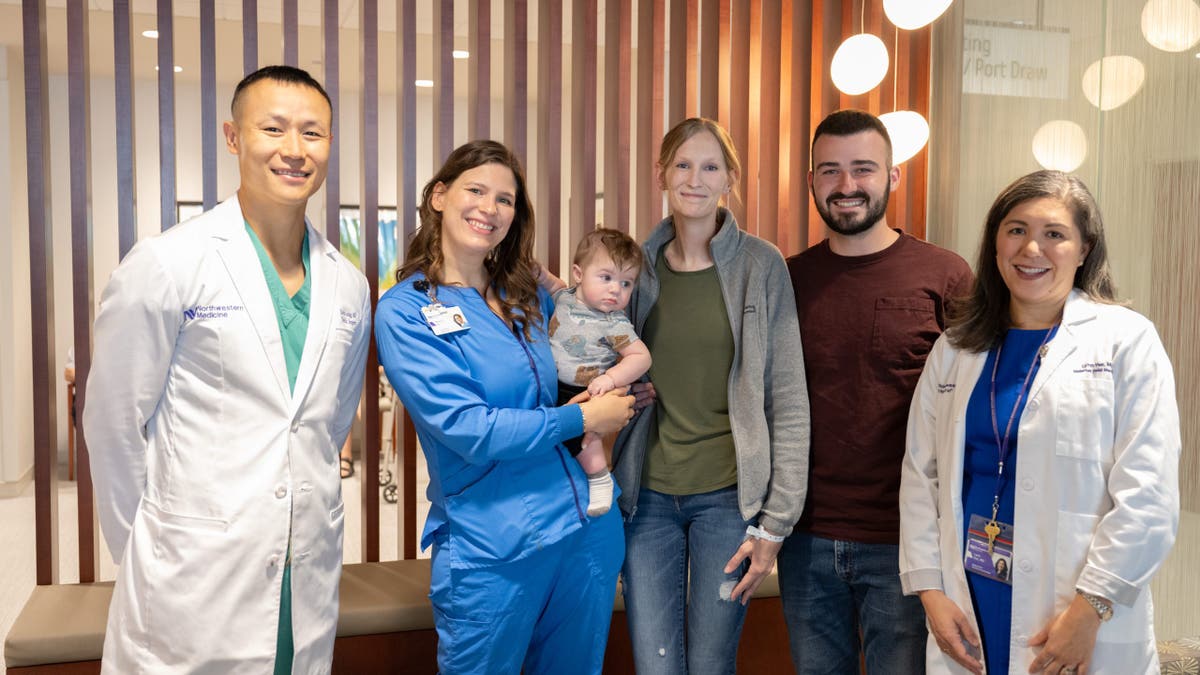
The Lauterbach family is pictured with, left to right, Dr. Kalvin Lung, registered nurse Mary Schuessler and Dr. Lynn Yee. (Northwestern Medicine)
“The surgery was risky relative to other cancer surgeries due to the need for cardiopulmonary bypass, and the need to repair the main artery going to both lungs, but it was done under very safe conditions with well-proven techniques,” Dr. Lung told Fox News Digital.
“We were concerned that even with the extent of surgery, we would not be able to completely remove the tumor,” he went on.
If the tumor had grown just slightly more into the main artery going to the lungs, or if it had involved the heart, it would have been a different outcome.
But the surgery was a success, and Lauterbach’s latest scans showed no evidence of metastatic melanoma.

Colter Lauterbach is pictured with Santa ahead of his first Christmas. (MaKenna Lauterbach)
“Her outcome was very good,” Dr. Lung told Fox News Digital. “She has recovered from surgery almost entirely, and her main issue is shortness of breath, which is a consequence of only having one lung.”
“In terms of cancer prognosis, we expect it to be quite good, given that the entire tumor responded to the immunotherapy treatment she received.”
‘New normal’
Today, though he was born three weeks early, little Colter Lauterbach is a thriving, happy baby boy.
“As for myself, I am still healing, emotionally and physically,” said MaKenna Lauterbach. “My lung capacity is getting close to ‘the new normal’ for me and I’m finally starting to return to some sort of normal routine.”
“There are some days when the bad memories and the unknowns haunt my thoughts.”
Looking ahead, Lauterbach will continue immunotherapy treatments for one year, and the doctors will continue to monitor CT scans to ensure the cancer doesn’t come back.
CLICK HERE TO SIGN UP FOR OUR HEALTH NEWSLETTER
Her cancer is currently considered a “stable disease,” doctors say, which means no new tumors have appeared.
The new mother, who turned 27 in October, said she is looking forward to her son’s first Christmas on the farm.
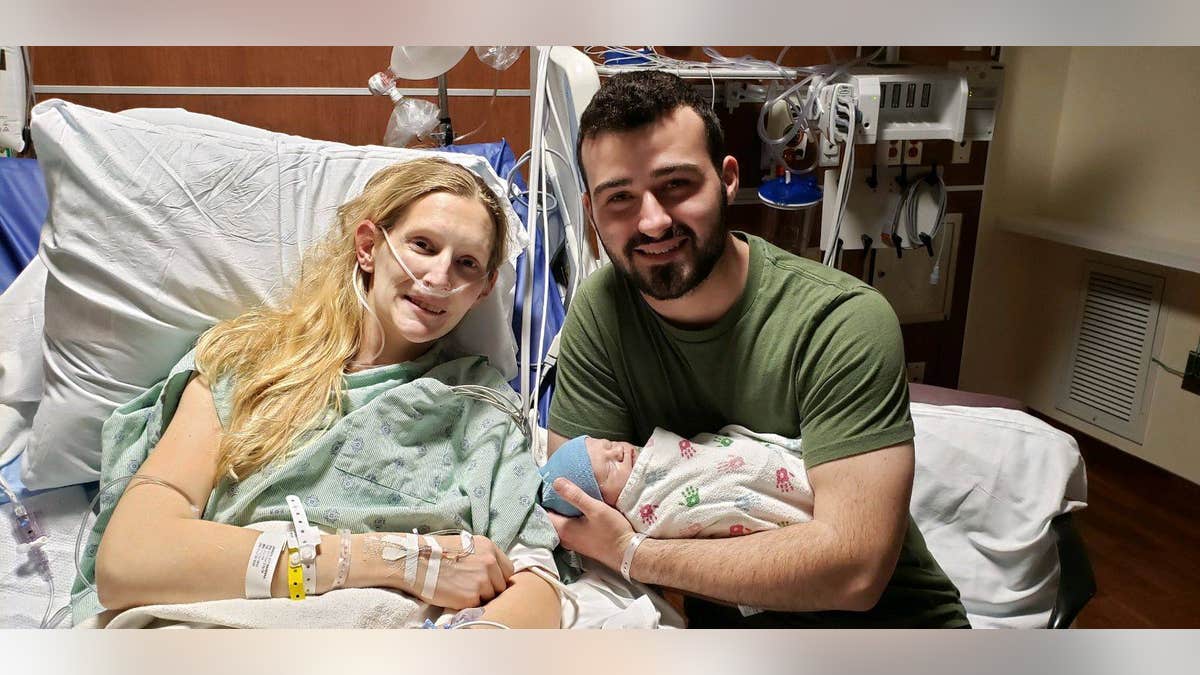
MaKenna and Parker Lauterbach are pictured with their son, Colter, after he was born by emergency cesarean section. (MaKenna Lauterbach)
“Emotionally, I try my best not to let reality weigh on me, but there are some days when the bad memories and the unknowns haunt my thoughts,” she said.
“Colter and my wonderful husband, Parker, are what have given me the strength to make it through everything.”
For more Health articles, visit www.foxnews.com/health
For other women, Lauterbach emphasized the importance of “knowing your body.”
She advised, “If you know something isn’t right, don’t take ‘I don’t know’ for an answer. Find someone who will take your concerns seriously and would rather do extra testing just in case, as opposed to missing something life-threatening.”
-
/cdn.vox-cdn.com/uploads/chorus_asset/file/24924653/236780_Google_AntiTrust_Trial_Custom_Art_CVirginia__0003_1.png)
/cdn.vox-cdn.com/uploads/chorus_asset/file/24924653/236780_Google_AntiTrust_Trial_Custom_Art_CVirginia__0003_1.png) Technology5 days ago
Technology5 days agoGoogle’s counteroffer to the government trying to break it up is unbundling Android apps
-

 News6 days ago
News6 days agoNovo Nordisk shares tumble as weight-loss drug trial data disappoints
-

 Politics6 days ago
Politics6 days agoIllegal immigrant sexually abused child in the U.S. after being removed from the country five times
-

 Entertainment7 days ago
Entertainment7 days ago'It's a little holiday gift': Inside the Weeknd's free Santa Monica show for his biggest fans
-

 Lifestyle6 days ago
Lifestyle6 days agoThink you can't dance? Get up and try these tips in our comic. We dare you!
-

 Technology1 week ago
Technology1 week agoFox News AI Newsletter: OpenAI responds to Elon Musk's lawsuit
-
/cdn.vox-cdn.com/uploads/chorus_asset/file/25672934/Metaphor_Key_Art_Horizontal.png)
/cdn.vox-cdn.com/uploads/chorus_asset/file/25672934/Metaphor_Key_Art_Horizontal.png) Technology2 days ago
Technology2 days agoThere’s a reason Metaphor: ReFantanzio’s battle music sounds as cool as it does
-

 News3 days ago
News3 days agoFrance’s new premier selects Eric Lombard as finance minister


/cdn.vox-cdn.com/uploads/chorus_asset/file/25742882/DSC_1384_Enhanced_NR.jpg)










